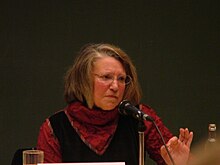Nancy Fraser
| Nancy Fraser | |
|---|---|
 |
|
| Born |
20 May 1947 Baltimore |
| Era | 20th-century philosophy |
| Region | Western Philosophy |
| School |
Critical theory, Post-structuralism, Feminist philosophy |
| Institutions | The New School |
|
Main interests
|
Political philosophy |
Nancy Fraser (born 20 May 1947) is an American critical theorist, feminist, and the Henry A. and Louise Loeb Professor of Political and Social Science and professor of philosophy at The New School in New York City. Widely known for her critique of identity politics and her philosophical work on the concept of justice, Fraser is also a staunch critic of contemporary liberal feminism and its abandonment of social justice issues. Fraser holds honorary doctoral degrees from four universities in three countries, and won the 2010 Alfred Schutz Prize in Social Philosophy from the American Philosophical Association.
Fraser earned her Bachelor's degree in philosophy at Bryn Mawr in 1969 and received her PhD in philosophy from the CUNY Graduate Center in 1980. She taught in the philosophy department at Northwestern University for many years before moving to the New School, and has been a visiting professor at universities in Germany, France, Spain, and the Netherlands. In addition to her many publications and lectures, Fraser is a former Co-editor of Constellations, an international journal of critical and democratic theory, where she remains an active member of the Editorial Council. She has been invited to deliver the prestigious Tanner Lectures at Stanford University and the Spinoza Lectures at the University of Amsterdam.
Fraser has written on a wide variety of issues, but she is primarily known for her work on the philosophical conceptions of justice in the tradition of feminist thinkers like Martha Fineman. Fraser argues that justice can be understood in two separate but interrelated ways: distributive justice (in terms of a more equitable distribution of resources), and the justice of recognition (the equal recognition of different identities/groups within a society). There are two corresponding forms of injustice: maldistribution and misrecognition. Fraser argues that many social justice movements in the 1960s and 1970s argued for recognition on the basis of race, gender, sexuality, or ethnicity, and that the focus on correcting misrecognition eclipsed the importance of challenging the persistent problems of maldistribution. In other words, Fraser asserts that too much of a focus on identity politics diverts attention away from the deleterious effects of neoliberal capitalism and the growing wealth inequality that characterizes many societies.
...
Wikipedia
